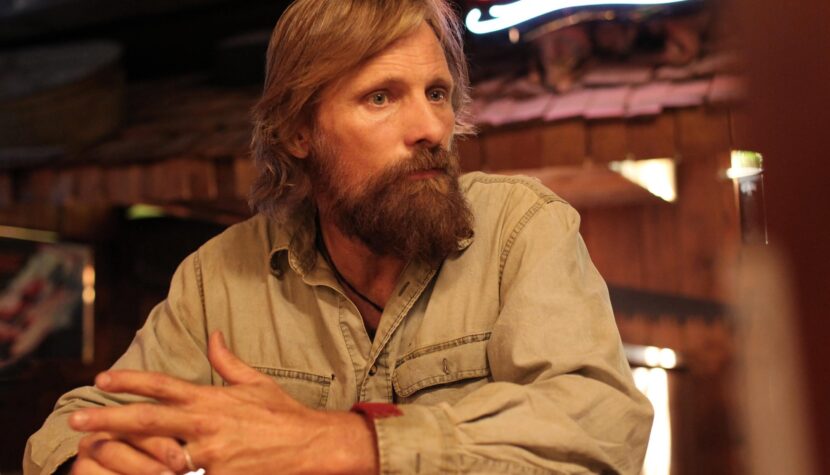CAPTAIN FANTASTIC. Oscar-worthy Viggo Mortensen vs. the rest of the world

Peter Weir directed a very good film, The Mosquito Coast, thirty years ago, in which Harrison Ford takes his family and moves them to the jungle in Central America to live better—away from the consumerist lifestyle and the looming threat of nuclear holocaust over the United States. The protagonist is convinced of his infallibility, which leads him down a path of self-destruction. In Captain Fantastic, Matt Ross takes a similar premise—a protagonist disillusioned with today’s world, retreating into nature, living solely within it—but introduces a few modifications.
Instead of ending like Chris McCandless, defeated by the wild world (which seems to mockingly say: “now you can go back to civilization, weakling”), he somehow conquers it—and even more, together with his wife, he brings into the world a whole brood of children who are over-programmed from an early age: hunting, rock climbing, knowing how to survive in the wilderness, speaking several languages, and having memorized the most important sociological, philosophical, and political concepts. One day, however, a pivotal message arrives—the news of the mother’s death, who, driven by a mental breakdown, was forced to return to society. The family decides to go to the funeral and fulfill the woman’s last wish, but here a cultural clash occurs. For even if these isolated individuals theoretically know everything, do they know anything about real life?

Ross wraps his story in a semi-fairytale convention—there are many exaggerations related to the whole situation, and it’s hard to take it seriously, especially when a dense accumulation of situations reminiscent of The Visitors occurs: when the cut-off-from-the-world protagonists collide with American everyday life (we get a police check, a pancake diner, a supermarket, or a church). However, the humorous elements are really well written (although sometimes the bizarre situations are overstrained, like in the scene with the knives) and fit into the main theme of the film, which is universal, despite the initially strong ideological bias of the whole—does a father, a guardian, have the right to shape children according to his own vision of the world, regardless of social conditions?
Should his own way of thinking be the only path for his descendants—after all, they can’t even celebrate Christmas, getting instead, very symbolically, Noam Chomsky Day. Ross sometimes exaggerates certain elements, but the fundamental question shines brightly and forces reflection, making the viewer ponder what freedom really is, how far one can go to extremes, and that perhaps it is worth compromising with the world sometimes.
Captain Fantastic ‘s Greatest Weapon
It would have been easy to ruin this plot, because despite great dialogues (the main character always says what he thinks), the whole thing slows down too much and stumbles during these Americo-exploitative dances. Fortunately, the director pulled out his greatest weapon here, which is Viggo Mortensen. The New Yorker plays his role fantastically and once again proves that complex family head characters are not foreign to him (A History of Violence, The Road)—he is repulsive in his quest to perfectly harden the children and in his radical approach to the American way of life, but at the same time he appears as a warm father, suffering after the loss of the most important person in his life, whom he could not help in any way, even despite his survival skills in any conditions.
Mortensen is the catalyst here, but the bunch of kids excellently support him—they are not just a humorous addition to the father’s inner turmoil, but integral elements of the story. Moreover, one of them undergoes their own complex journey, despite the crowd of characters. Frank Langella, as always, must also be praised; he has great fun with the character of the protagonist’s father-in-law, surprisingly ambiguous.

Ross’s film, although it initially seems like an absurd comedy about oddballs forced to rejoin the world that rejected them, quickly presents the audience with a series of thought-provoking questions. Not everything is sufficiently developed here; the whole thing leaves a bit of a feeling of incompletion, especially after the initial narrative buildup, and the ending is abrupt—although the last scene is brilliant and forms a clever closure.
Ultimately, however, it is a really intriguing story about the pitfalls of parenting, outdated ideas now confined to biopic shelves in supermarkets, and a contemporary America stuck in its thinking, which is forced by the sudden intrusion of the rebellious Captain Fantastic, long cast out, to reflect on itself. And Viggo Mortensen has the clout, and his Oscar nomination was well deserved. Such a story would probably have been written by John Steinbeck if he were born in the counterculture era and was now looking through a smoky joint at a breakneck-speed America that has lost family values along the way.

